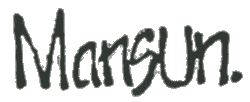
The TransAction Interview with Dominic Chad
Mansun performed at Reading Fest on the main stage, Friday, August 28th.
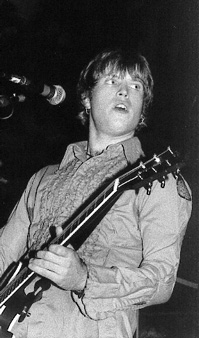
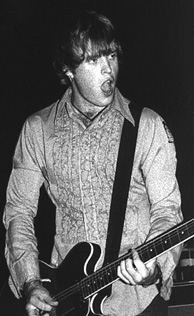
Dominic Chad

The TransAction Interview with Dominic Chad
Mansun performed at Reading Fest on
the main stage, Friday, August 28th.


Dominic Chad
Interview & photos
by Karena Bernard
This interview was conducted in June 1997 and first appeared in the September 1997 print version of TransAction Magazine.
The Band: Background and more photosPaul Draper- Vocals & Guitar
Dominic Chad - Lead Guitar & Backing Vocals
Stove King - Bass Guitar
Andie Rathbone - Drums
Karena Bernard: What do you think of Mansun's insane popularity in Japan?
Are you comfortable with being such a public person?
Dominic Chad: I think it was quite a laugh when we went over there-being treated
like that, especially the first time we went over there. We found ourselves to be
more popular over there than we were here [in the UK] at the time. But to a certain
extent I think thatís the case for pretty much any British band at the minute over
there. They tend to have an obsession with British bands in general.
KB: It must take some getting used to, though.
DC: Yeah, I mean we were sort of told before we went over there that that was pretty
much what to expect--by people who have been over there with other British bands.
There are bands, such as Blur, who are huge over there. I think Supergrass as well.
They can't walk around. We were told that it's pretty crazy for British Bands at
the moment, so we were prepared for it. I mean you go over there for a week and it's
all good fun, then you come back to real life, working in studios and trying to make
records. You get back down to earth a bit.
KB: What happened to the young woman who tried to kill herself in front of Paul?
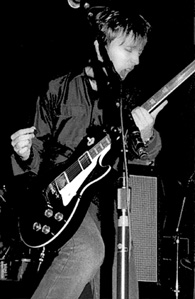
Paul Draper
DC: Oh I think thatís a bit exaggerated . We went
to this nightclub in Tokyo. Paul wasn't actually there. It was me and Andy, and a
girl came up to us and just kinda drew this knife out and just started kind of drawing
across her arms. Nothing very bad or anything. She just was sort of grazing herself.
But not the sort of thing you'd want someone to start doing in front of you. One
of our road crew was there as well, so he just grabbed the knife off of her and went
out and threw it away. Then we sort of, ehm, made a sharp exit (laughs).
...this scout came up from
London--he came in and asked if he could listen to us. And he went away and literally
like a week later he phoned us up and said there's a publishing deal if you want
it, and we said, "Oh great!" So we did it. We packed our jobs in not knowing
what we were doing and set up our own record label called Sci-Fi High-Fi Records
and released two singles on that.
KB: Wow, that really got exaggerated. I was told that someone went up to Paul and
plunged a knife in her heart and the blood was gushing out and she almost died...(laughs)
DC: Oh no! Well we'll have to clear that one up, then. These stories sort of do get
bigger, don't they?
KB: Was she put off by the band? Do you have any idea on what might have brought
that on?
DC: No, because she actually turned up for the gig the next night. Another girl came
up to us and said that the girl who started cutting herself said she's sorry. She
wanted to apologize for freaking us out. She was only a kid, probably about 17. That
was her way of getting attention. She thought that was the way to do it--to get the
attention of a rock band. Unfortunately, she obviously misjudged us and the things
we're were into.
KB: Maybe Marilyn Manson would have been a little more supportive of that.
DC: Possibly (laughs).
KB: Glastonbury! That must have been a stunner. On stage....
DC: ...and then off stage.
KB: What did the band do? Were you all just shocked? [Mansun's set was cancelled
after only one song due to technical problems caused by the flooded concert site.]
DC: We weren't shocked in as much when you turn up to a festival like that and it's
basically how ever many miles from anywhere and they're trying to sort of run power
out into the middle of a farm to power up a band and a huge light show, sometimes
something is gonna go wrong. Plus there was two feet of mud across the whole site,
and for the whole weekend people were throwing handfuls of mud at the bands on stage.
Certain bands that they didn't like, particularly--and especially the ones who asked
them not to throw mud on stage.
KB: Of course.
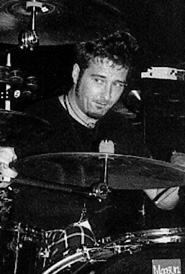
Andie Rathbone
DC: Well you would, wouldn't you. So I think that
by the time we got on was the generator that we were running off of was caked in
dirt. Because we were the second to last band on, they didn't have time to get us
off, change the generator and let us start again because we would have set the last
band back how ever long. So we just had to say,"right. Let's go home."
The Bluetones were on after us and everything was ok for them cause, you know, they
changed the generator.
KB: Did they make it up to you in any way, like say, "Oh, we'll get you on next
year?" Or was it just sort of, "Oh well. That's that..."
DC: No, well, there was definite apologies, and that sort of thing and I hope they'll
invite us back! So, yeah, we'll have to see. But we got very good reviews for the
one song we did play...
KB: It was Stripper Vicar, wasn't it?
DC: Yeah....and the review said it was great. (laughs)
KB: Well, at least you got something out of it! How do you like playing the festivals
otherwise- the weather factor and the technical factor aside-playing to that many
people in an outdoor situation?
DC: It's great! I mean, we love playing live, being on stage. It's the element of
being in a band that appeals to us all the most, really. And, yeah, at the festivals,
obviously, you do get to play to a big crowd. We did T in the Park last weekend,
the festival in Scotland. We were the second to last band on, before The Seahorses.
It was actually in a big marquis, the stage there. When we went onó and the place
was absolutely packed, all the entrances to the marquis had people sort of spilling
out; and you can see people standing way out just trying to see in through the gapsówe
walked onto massive cheers.
I didn't grow up in Chester
but in the time I lived there, there was very little to do. So that's pretty much
where the band came from. I guess that was something that the others grew up with.
It's quite a small town with quite a small town attitude. A majority of the people
who live there can't see that there is a world beyond the city walls, and they have
no ambition to ever get out. We weren't a part of that, and had never been a part
of that mentality.
KB: What was it like going out with Suede?
DC: Great! Yeah. They're a really nice band. Very friendly. Treated us very well.
And we like them as well; we like their stuff... as much as we like any British music.
(laughs)
KB: OK...back to that in a second. You've opened for Bowie, you've gone out with
Suede. Who else would you most like to tour with?
DC: Hmmm. I'd like to tour with Jimi Hendrix, but that's not possible. That's a hard
one. I've actually been listening to a lot of Rage Against the Machine recently.
It would be great to go out with them. It would be good to tour with a really good
rock band, ya know what I mean?
KB: Sure. You've hinted that you weren't really hot on British music.
DC: Not particularly, no. The one thing, as a band, that we all have in common as
far as musical tastes are concerned is rock music, and there are not a lot of British
bands that do that very well...very convincingly. I'd be hard pressed to think of
anyone,really, any British band I consider to be a good rock band. So, yeah, I mean
thereís very little in terms of British music going on in our CD piles at the moment.
Personally speaking, I'm a Hendrix fan. I'm into Hendrix, I'm into Brian Jones, I'm
into the Velvet Underground, I'm into Nirvana. These are all people I obviously can't
tour with. But yeah, Rage Against the Machine are cool. That's what I've been listening
to of late.
I'm a Hendrix fan. I'm
into Hendrix, I'm into Brian Jones, I'm into the Velvet Underground, I'm into Nirvana......Rage
Against the Machine are cool. That's what I've been listening to of late.
KB: You're labeled New Grave, sort of a rebellion against Britpop...
DC: Are we?
KB: Yeah, so this is new to you. You haven't heard that?
DC: No.
KB: The press has called you, Placebo and Radiohead New Grave music.
DC: (Laughs) In what way?
KB: Because it's sort of moody, and not happy and poppy as Brit-pop is, sort of a
reaction against Britpop. So that sort of fits in with what you were saying.
DC: Yeah, I suppose a lot of what we do is on the darker side, kind of pulls away
a lot of dark melodies; melancholy or whatever. Yeah, dark pop songs, dark rock songs,
that's the stuff that we're into. In this country, it's very fashion led, and movements
are very much part of fashion, and so the music press likes to create movements.
I guess we probably didn't fit in with anything they had up their sleeves at the
time, so they had to create something for us-have to give us our little niche, which
is kind of nice of them.
KB: You've also been referred to as a glam band, do you have any problem with that,
or what is your opinion about that?
DC: No, we don't have a problem with that at all. I mean we've been referred as a
lot of things, cause to a certain extent, our tastes our very eclectic. Rock is something
we're very much into, but we all have individual tastes which don't necessarily tally
with one another. Between us we listen to all sorts of stuff as well as rock: Rap,
hip-hop, dance, eighties pop, seventies disco and, yeah, glam rock. Weíre big Bowie
fans. I mean, also, you only have to mention one of these things once, and people
sort of label you as that. We said in the past we were into eighties pop, and all
of a sudden we've become a strictly eighties pop influenced band.
KB: So you use each other's reactions.
DC: Yeah, exactly. And we don't work with producers, so we don't have anyone saying,
"Oh no you can't do that." It's pretty much, if we get an idea and we want
to implement it, we can, as long as the equipment is around. But it usually is cause
we've accumulated so much stuff in the course of the year that we've been signed.
We spent a lot of time looking out for unconventional keyboards and different guitars
and different amps, and samplers and sequences, and all sorts of things. And right
now we're quite into writing nice string arrangements and things like that, and spend
a lot of time writing vocal harmonies and basically we have the wherewithal to do
pretty much anything we want to do on our records, and so we do! As a result no two
people ever name the same influence that they hear in the stuff, which is cool.
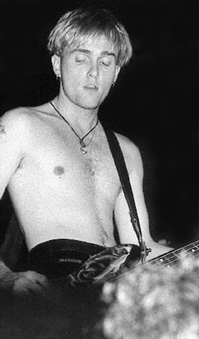
Stove King
KB: It's also been said, to reinforce what you've
just stated, that Mansun is a contradiction, that the minute you're labeled as something,
you'll turn around and do something completely opposite, so that all the preconceptions
are thrown out.
DC: Right. We'll very much go on our instincts on pretty much anything. We'll kind
of get up one day and feel like doing something completely different from what we've
been doing every other day, and we'll just do it. It could be something musical or
it could be going out and buying a suit and wearing it, you know what I mean? And
people go, "Oh you're wearing a suit! You've never worn a suit before."
And it kind of confuses them. And it's the same sort of thing with the music. We
don't actually set out to confuse people, but we enjoy experimenting with all sorts
of things. That's something we do a lot of.
There was one particular
Dr. Who shirt, which was the best one. It was a frilly shirt but it was a zip up.
I've never seen a frilly shirt with a zip, I haven't been able to find one, but I
really want one. See what you can sort out.
KB: OK. Regarding the dress thing, one consistent thing that I noticed is that you
seem to really
DC: Yeah, definitely! (said with much enthusiasm) Myself and Paul are big fans of
Dr. Who, the old British sci-fi TV show, and there was one actor who played Dr. Who
in the seventies called John Pertwig. [I may not have the last name correct. Are
there are any Dr. Who fans reading this? -Ed.] And his trademark was that he always
wore frilly shirts and that's something that I was really into. It's kind of something
I've always copied, really. I've always loved buying old seventies frilly shirts,
and when we got the band together I didn't see any reason to change.
KB: It's a chance to wear them all.
DC: Yeah, exactly. Now I never have to change out. So that's where that comes from.
And also I suppose it also comes from Brian Jones as well. He was one of my heroes.
I quite liked his eccentricity and the way he dressed. But it's very much a Dr. Who
thing. There was one particular Dr. Who shirt, which was the best one. It was a frilly
shirt but it was a zip up. I've never seen a frilly shirt with a zip, I haven't been
able to find one, but I really want one. See what you can sort out.
KB: OK. I'll get that in print and see if I can come up with a few.
DC: Yeah!
KB: Ok. There was a period you went through where you were testing the limits of
rock 'n' roll excess. What was your feeling about that?
DC: That was an extension of kind of the fact that before we were a band were four
lads who had a laugh together. Basically we didn't have any other friends so we just
hung out together. You know, and we like a party as much as the next four people,
but itís something we keep to ourselves, itís not something we go down to London
to do in front of a lot of people. But obviously, when you get on the road...now
people are around and they see and they come in on it. But it didn't last very long
because we realized straight away that we couldn't do that and get on stage and deliver
a decent show. Or get in the studio when we weren't touring and make good records,
and that was what we wanted to do more than anything; to play good shows and record
good records. So pretty much as soon as we got signed, we stopped messing around.
I guess a few people saw a few good parties when we started out. Maybe we're just
more fun to be with than other people, I don't know.
So pretty much as soon
as we got signed, we stopped messing around. I guess a few people saw a few good
parties when we started out. Maybe we're just more fun to be with than other people,
I don't know.
KB: Also because success came pretty quickly since you formed the band and you started
going around to record companies. Well, you started out with your own label, but
soon after that, you were picked up by a major label so you didnít have that long
stretch of time to ponder what this is all about. It's just a lot to handle in a
short period of time.
DC: Right, well we were quite excited about the whole thing, obviously. We had no
preconceived ideas of what any of it involved because it was something that was almost
sprung upon us. We became serious about being a band, when we realized that there
were people who wanted to sign us and people who wanted to see us play and things
like that. But that wasn't why we formed the band--we formed the band because we
had nothing else to do. So when we started out, it was quite exciting, really! We
weren't thinking," this is what we thought it would be like, and we're we right?"
We weren't wasting time finding out if the business was everything we thought it
would be, cause we didn't know. So it was just quite exciting to suddenly be presented
with the opportunity of going out to play some gigs and make records for a living.
Once we started doing that, we realized how much we loved doing it. When we signed
the record deal, we thought, "Right. Time to knuckle down and really take this
seriously. " That's when we really started to put our heads into the band.
We became serious about
being a band, when we realized that there were people who wanted to sign us and people
who wanted to see us play and things like that. But that wasn't why we formed the
band--we formed the band because we had nothing else to do.
KB: What was it like growing up in Chester?
DC: Well I didnít really grow up in Chester, I lived there for like six years, I
grew up in the South of England, in a place called Maidstone, it's about 30 miles
southeast of London in the county of Kent. I left there about when I was seventeen
and moved up northwest to Chester. I started going to college in North Wales, cause
Chester is just on the border of England and Wales. I studied languages, but kind
of got fed up with that pretty quickly because I realized that I wasn't really cut
out for full time studying. My attention span didn't suit it. (laughs) The first
thing I did was to just get a job as a barman, and I got dangerously close to making
a career of it as well. I stayed working there for quite a while. That's how I got
to know Paul and Stove cause they used to come drink in the bar where I worked, and
we became mates.
KB: So you really have to create your own entertainment--get something together.
DC: It was either sit around Chester with nothing to do when you're not working or
to sort of create something to do. Chester is between Manchester and Liverpool, not
far from either. Manchester and Liverpool do have music scenes, so we'd go out and
check out local bands playing in pubs in Liverpool and Manchester for something to
do because there's no music in Chester, whatsoever. In comparison to Chester, Manchester
and Liverpool are...'kickin'.
KB: But it was sort of a blessing in that you were forced to be creative or be bored.
Things weren't there to entertain you. So where was the first gig you ever played
as a band?
DC: It was actually in Liverpool in a little club called The Lomax.
KB: How many people were there?
DC: Not many, probably about fifty people and most of them were from record companies
because for the first couple of gigs we did, we were just being checked out constantly.
We signed our publishing deal just before that. We were listened to through the door
of our rehearsal room-just banging away on our guitars. Someone must have seen into
it because this scout came up from London--he came in and asked if he could listen
to us. And he went away and literally like a week later he phoned us up and said
thereís a publishing deal if you want it, and we said, "Oh great!" So we
did it. We packed our jobs in not knowing what we were doing and set up our own record
label called Sci-Fi High-Fi Records and released two singles on that.
KB: Parlophone
DC: Yeah and Epic in America.
KB: Wow. You've had a pretty smooth path as far as opportunities go. But it's still
a lot of work even if the opportunities are right there. Also, a lot of learning.
Now onto the states, have you played the states before?
DC: We played once in a club called Wetlands.
We came over basically to do a week of promotion for Epic. They brought us over to
do some interviews with magazines, radio...whatever, and to do a showcase gig in
New York. A lot of people came down to see us, and we got a good reaction so we're
really looking forward to coming back. It's something we really want to do-a tour
in America-because we love playing live, and it's such a big country. It's great
to get on the road and do all of that traveling and play all those different places.
There are not many other countries with those many places you can play. If you love
touring, it's the place to come to, America, isn't it?
KB: Yeah. You can probably play all year long and start all over again.
DC: And there are so many people to play to over there who havenít heard us yet,
and we do love the challenge of playing to a new audience and trying to win people
over-trying to sell the records, you know.
KB: So you're looking forward to the challenge of The States, which has been a steep
challenge for a lot of acts that are successful
internationally-except for the states.
DC: Yeah. There was a lot of hard work in the UK for the year too. We were constantly
going back and forth to the same small venues again and again. But now we're at the
point where we haven't done that, we've been playing big venues-upwards of two thousand
people a night. There were other shows as well. We did a support show back in May
where we played to fifteen thousand people. There are opportunities to do big shows
like that are coming our way now. On our own tour, we're usually playing to two,
three thousand people. So we're looking forward to getting back out and really starting
again with the touring and working up. There are a lot of bands in the UK that aren't
into it and almost see it as a bind. They can't get out and get on a bus.
KB: But you love touring right?
DC: Oh absolutely. To a certain extent for us it's our favorite part of being in
a band. We also love recording, but that's a totally, totally different world to
us because we do things in the studio that are very experimental, and we do whatever
comes into our heads. But live we see ourselves as a rock band. We go out and work
everything out as two guitars, bass and drum, and it's totally different from the
records.
KB: So you do expand upon the material live. Can we expect to get longer versions
of the songs...?
DC: We don't go and reproduce the album. We do it with more of an edge. It's more
basic. It's rockin. Songs come through better a little more stripped down. Sometimes
we'll do an acoustic number because we can't put the songs across any better than
on an acoustic guitar. So, yeah, we strip everything down and we go out and play
as a rock band. It's so different from being in the studio. And because we've got
the two different sides to us, we never get bored of either one. When we come to
the end of a tour, we think, "great we can go into the studio now," and
it's totally different. And then when we come to the end of a studio session, itís
like, "great we can go back out and tour," and do that bit. So we're always
looking forward to the other one, but still enjoying what we're doing.
KB: So you can be creative in the studio and then go out on tour and get a reaction
to it. Doing different versions of the material...taking it on to the next phase.
DC: Yeah. The other thing about touring is that we actually get to write new stuff.
We take our acoustic guitars with us, and we just sit and write new songs in the
hotels and buses. That's basically where the new stuff comes from-the material we
take into the studio. We don't take any time off. We're actually building up our
own studio back home. We've just been constantly collecting bits of equipment over
the last year, since we've been signed. We've got a set up at home where we can come
up with demos and stuff. We book studio time for when we're not on tour. But on our
own, at, say, 2 or 3 in the morning we can get on our own gear and kind of whack
ideas down and take them into the studio the next day. We don't leave ourselves with
any time for writing songs except on the road-that's the best time to do that. When
you're waiting in hotels or to get on stage or after the gig when you get back to
the hotel, or when you're sitting on the bus driving between towns.
KB: So not any down time?
DC: Not really. It's not been a problem yet. Cause we found that when we took a week
off for Christmas, we all got bored. So, no, it's not been a problem. We were all
kind of biting our fingernails by the end of the week. Just gagging to get back to
doing something, really.
KB: And everyone gets on really well?
DC: Yeah, absolutely, that's what the band came out of anyway; the band came out
of four friends and not the other way around. It wasn't like we were four people
looking to be in a band, we were a band before we were a band, ya know what I mean?
Stove had never played anything, and he actually bought a bass guitar and taught
himself to play it when we decided to form a band. So we were friends first and then
we became a band.
KB: Well you've had some success here, with Wide Open Space being played here on
the radio, that should pave the way for you-- create a nice bit of anticipation.
I guess thatís it then. Anything else that comes to mind?
DC: I think we pretty much covered everything. I'm really looking forward to getting
out! And We're gonna be over there soon. Next Wednesday we fly out, so.....
KB: Ok. Well I'll try to find some frilly shirt shops. Maybe I'll find one with a
zipper.
DC: Yeah, thanks.
KB: OK. Thanks so much. Bye.
DC: Bye.
Miae Shin contributed interview questions.
Transcribed by Jessica Rotter and Miae Shin
1998 ©TransACTION Inc. All Rights Reserved.